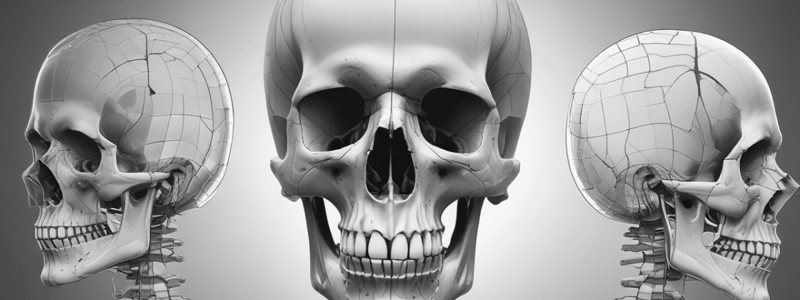Podcast
Questions and Answers
The CRANE DE PROFIL uses a 25° caudal rayon.
The CRANE DE PROFIL uses a 25° caudal rayon.
False (B)
The CRANE BLONDEAU position requires the subject to have their mouth open and supported by the chin.
The CRANE BLONDEAU position requires the subject to have their mouth open and supported by the chin.
True (A)
The CRANE DE PROFIL has a centration of 3 cm above the tragus.
The CRANE DE PROFIL has a centration of 3 cm above the tragus.
True (A)
The CRANE FACE HAUTE uses a 70KV/70mAs setting.
The CRANE FACE HAUTE uses a 70KV/70mAs setting.
The CRANE BLONDEAU requires a rotation of OM-50°.
The CRANE BLONDEAU requires a rotation of OM-50°.
Flashcards are hidden until you start studying
Study Notes
Cranial Radiography
- Crane de Profil: horizontal beam direction, 1M DFR, 70kV, 60mAs, centered 3 cm above the tragus
- Positioning: patient is positioned with OM=0, PSM 15°, with the occipital bone visible
- Criteria for Success: superposition of the orbital roofs and the greater wings of the sphenoid, and symmetrical appearance of the temporal fossae
Cranial Radiography (Blondeau Method)
- DFR: 1M
- Beam Direction: horizontal
- Exposure: 70kV, 70mAs
- Positioning: extension of the head, mouth open, and supported by the chin, with OM=-50°
- Centering: beam is centered on the acanthion
- Criteria for Success: the entire facial mass is visible, with equidistance of the zygomatic bones and the parietal vault
Cranial Radiography (Face-High Method)
- Beam Direction: 25° caudal
- Exposure: 70kV, 70mAs
- Centering: beam is centered on the nasion
- Positioning: patient is positioned with OM=-25°, with flexion of the head and hands on the potter
- Criteria for Success: superior orbital fissures project into the orbital borders, and the intercalvaria lines are identical on both sides
Studying That Suits You
Use AI to generate personalized quizzes and flashcards to suit your learning preferences.




